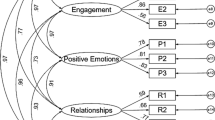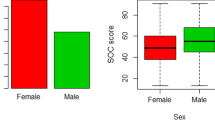Abstract
The Short Depression Happiness Scale (SDHS) was developed to simultaneously assess depression and happiness on the opposite ends of the emotional valence continuum. The present study aimed to investigate and further validate the factor structure of the SDHS in a convenience sample of a large Arabic-speaking community. As part of an online survey, participants (n = 656) completed the SDHS, the Satisfaction with Life Scale, the Depression, Anxiety and Stress Scale-21 and the Ten-Item Personality Inventory. To independently perform exploratory factor analysis (EFA) and confirmatory factor analysis (CFA), the data were randomly split into two halves. The results of the EFA and CFA provided a one-factor solution as the satisfactory-fitting model for the scale (X2 = 43.39, df = 9, p < .001; CIMIN/DF = 4.82, CFI = .94, TLI = .91, RMSEA = .11, SRMR = .05). The convergent validity of the SDHS was confirmed via the relationships with life satisfaction, depression, anxiety, stress and personality traits (correlations ranged between .23 and − .72). The SDHS explained unique variance (Δr2 = ranged between .06 and .23%) in well-being indicators above and beyond the personality traits. The Arabic translation of the SDHS was consistent with the original solution that would facilitate the advancement of happiness research across cultures.

Similar content being viewed by others
Data Availability
The datasets generated during and/or analysed during the current study are available from the corresponding author on reasonable request.
References
Abdel-Khalek, A. M. (2008). Satisfaction with life in Kuwaiti samples. Derasat Nafsiyah [Psychological Studies], 18, 121–135 [In Arabic].
Ali, A. M., Ahmed, A., Sharaf, A., Kawakami, N., Abdeldayem, S. M., & Green, J. (2017). The Arabic version of the depression anxiety stress Scale-21: Cumulative scaling and discriminant-validation testing. Asian Journal of Psychiatry, 30, 56–58.
Beck, A. T., Rush, A. J., Shaw, B. F., & Emery, G. (1979). Cognitive therapy of depression: A treatment manual. New York: Guilford.
Cohen, J. (1992). Power primer. Psychological Bulletin, 112, 155–159.
Diener, E. D., Emmons, R. A., Larsen, R. J., & Griffin, S. (1985). The satisfaction with life scale. Journal of Personality Assessment, 49(1), 71–75.
Diener, E., Suh, E. M., Lucas, R. E., & Smith, H. L. (1999). Subjective well-being: Three decades of progress. Psychological Bulletin, 2, 276–302.
Diener, E., Wirtz, D., Tov, W., Kim-Prieto, C., Choi, D. W., Oishi, S., & Biswas-Diener, R. (2010). New well-being measures: Short scales to assess flourishing and positive and negative feelings. Social Indicators Research, 97(2), 143–156.
Gosling, S. D., Rentfrow, P. J., & Swann Jr, W. B. (2003). A very brief measure of the Big-Five personality domains. Journal of Research in Personality, 37(6), 504–528.
Hills, P., & Argyle, M. (1998). Positive moods derived from leisure and their relation to happiness and personality. Personality and Individual Differences, 25, 523–535.
Hu, L. T., & Bentler, P. M. (1999). Cutoff criteria for fit indexes in covariance structural analysis: Conventional criteria versus new alternatives. Structural Equation Modeling, 6, 1–55.
Joseph, S., & Lewis, C. A. (1998). The depression – Happiness scale: Reliability and validity of a bipolar self-report scale. Journal of Clinical Psychology, 54, 537–544.
Joseph, S., Linley, P. A., Harwood, J., Lewis, C. A., & McCollam, P. (2004). Rapid assessment of well-being: The short depression-happiness scale (SDHS). Psychology and Psychotherapy: Theory, Research and Practice, 77(4), 463–478.
Kenny, D. A., Kaniskan, B., & McCoach, D. B. (2015). The performance of RMSEA in models with small degrees of freedom. Sociological Methods & Research, 44(3), 486–507.
Lefever, S., Dal, M., & Matthiasdottir, A. (2007). Online data collection in academic research: Advantages and limitations. British Journal of Educational Technology, 38(4), 574–582.
Lewis, C. A., Khukhrin, M., Galyautdinova, S., Musharraf, S., & Lewis, M. J. (2017). The short depression happiness scale: A Russian translation. Indian Journal of Positive Psychology, 8(1), 48–50.
Lomas Martínez, D., Fernández Muñoz, J. J., & Navarro-Pardo, E. (2018). Spanish version of the short depression-happiness scale (SDHS): A reliability and validity study in a simple of Spanish elderly people. Acción Psicológica, 15(1), 17–24.
Lovibond, P. F., & Lovibond, S. H. (1995). The structure of negative emotional states: Comparison of the depression anxiety stress scale (DASS) with the Beck depression and anxiety inventories. Behaviour Research and Theory, 33, 335–343.
Lyubomirsky, S., & Lepper, H. S. (1999). A measure of subjective happiness: Preliminary reliability and construct validation. Social Indicators Research, 46(2), 137–155.
MacCallum, R. C., Browne, M. W., & Sugawara, H. M. (1996). Power analysis and determination of sample size for covariance structure modeling. Psychological Methods, 1(2), 130–149.
McGreal, R., & Joseph, S. (1993). The depression-happiness scale. Psychological Reports, 73, 1279–1282.
Russell, J. A., & Feldman Barrett, L. (1999). Core affect, prototypical emotional episodes, and other things called emotion: Dissecting the elephant. Journal of Personality and Social Psychology, 76, 805–819.
Sabah, A. (2018). Big five factors of personality among sibling with an intellectual disability and its relationship with some variables. Journal of Social Sciences, 7(28), 116–131.
Sapma, Z. F., & Temizel, S. (2013). Turkish version of the short depression-happiness scale (SDHS): A validity and reliability study. The Journal of Happiness and Well-Being, 1(1), 28–33.
Seligman, M. E. P., & Csikszentmihalyi, M. (2000). Positive psychology: An introduction. American Psychologist, 55(1), 5–14.
Soto, C. J. (2015). Is happiness good for your personality? Concurrent and prospective relations of the big five with subjective well-being. Journal of Personality, 83(1), 45–55.
Sousa, V., & Rojjanasrirat, W. (2010). Translation, adaptation and validation of instruments or scales for use in cross-cultural health care research: A clear and user friendly guideline. Journal of Evaluation in Clinical Practice, 17(2), 268–274.
Streiner, D. L., & Norman, G. R. (2003). An introduction to the statistical developments and applications section. Journal of Personality Assessment, 80(1), 3–3.
Sumer, N. (2000). Yapısal eşitlik modelleri: Temel kavramlar ve örnek uygulamala. Türk Psikoloji Yazıları, 3(6), 49–73.
Tabachnick, B. G. (2013). Using multivariate statistics (6 edn). Boston, MA: Pearson Education.
Yildirim, M., & Alanazi, Z. S. (2018). Gratitude and life satisfaction: Mediating role of perceived stress. International Journal of Psychological Studies, 10(3), 21–28.
Yıldırım, M., & Belen, H. (2019). Evaluation of short depression happiness scale: A reliability and validity study. In Paper presented at 21st International Psychological Counseling and Guidance Congress. Antalya: Turkey.
Acknowledgements
The authors would like to thank all the participants who voluntarily took part in this study.
Author information
Authors and Affiliations
Contributions
All authors contributed to the study conception and design. Study design, material preparation, analysis and writing up the manuscript were performed by Murat Yıldırım. Material preparation and data collection were performed by Noor Bakr Balahmar. The first draft of the manuscript was written by Murat Yıldırım. All authors read and approved the final manuscript.
Corresponding author
Ethics declarations
Conflict of Interests
The authors declare that there are no competing interests.
Ethical Approval
All procedures performed in studies involving human participants were in accordance with the ethical standards of the institutional and/or national research committee and with the 1964 Helsinki declaration and its later amendments or comparable ethical standards.
Informed Consent
Informed consent was obtained from all individual participants included in the study.
Additional information
Publisher’s Note
Springer Nature remains neutral with regard to jurisdictional claims in published maps and institutional affiliations.
Rights and permissions
About this article
Cite this article
Yildirim, M., Balahmar, N.B. Adaptation and validation of the Arabic version of the short depression-happiness scale. Curr Psychol 41, 7024–7031 (2022). https://doi.org/10.1007/s12144-020-01214-0
Accepted:
Published:
Issue Date:
DOI: https://doi.org/10.1007/s12144-020-01214-0




